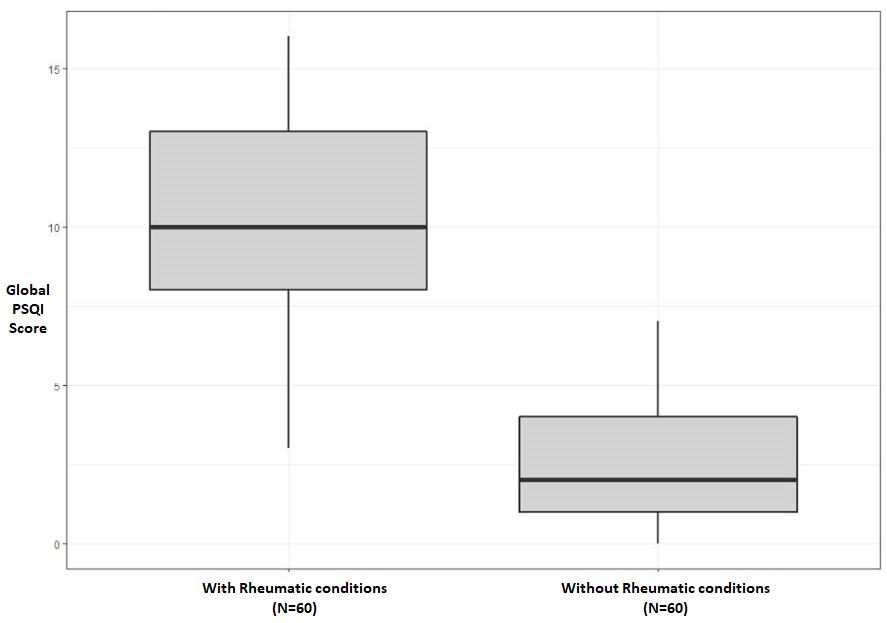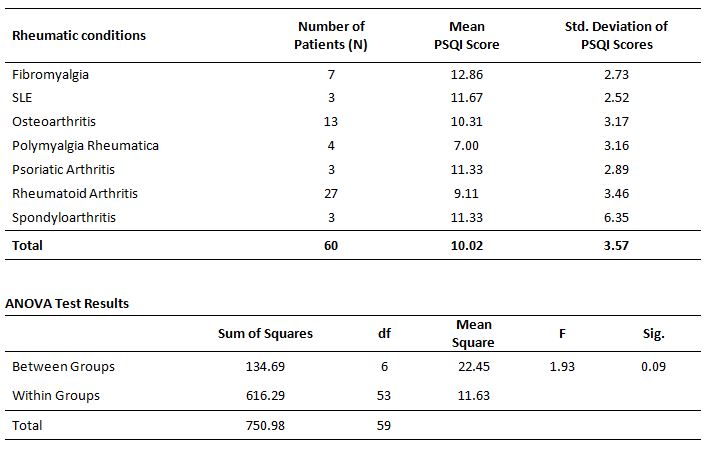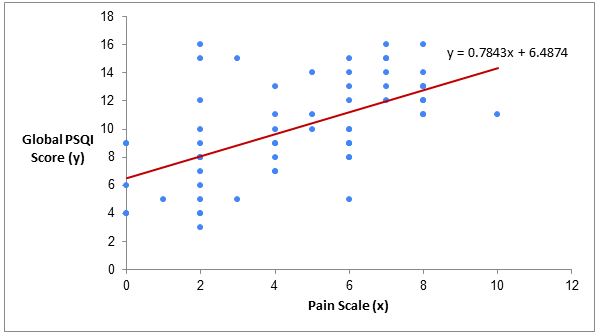Session Information
Date: Sunday, November 7, 2021
Title: Measures & Measurement of Healthcare Quality Poster (0623–0659)
Session Type: Poster Session B
Session Time: 8:30AM-10:30AM
Background/Purpose: Sleeping difficulties although common in rheumatic patients, have often been overlooked presuming it to be part of a chronic illness. We conducted a survey-based study comparing the quality of sleep in patients with rheumatic diseases vs. healthy individuals employing the Pittsburg Sleep Quality Index (PSQI) and analyzing other factors, especially pain that effects sleep quality. PSQI is a self-rated questionnaire which assesses the sleep quality over a 1-month time interval. A total score > 5 is indicative of poor sleep quality.
Methods: Adult patients in an outpatient setting with rheumatic conditions were handed out the survey that included PSQI questionnaire and additional questions related to other factors affecting sleep quality. The rheumatic conditions included were Rheumatoid arthritis, Osteoarthritis, Psoriatic arthritis, Fibromyalgia, Polymyalgia rheumatica (PMR), Spondyloarthritis and Systemic lupus erythematosus (SLE). Healthy subjects were also handed out the surveys. Participation was anonymous and voluntary. Data were analyzed using descriptive statistics, t-tests, ANOVA, and regression analysis.
Results: The results have been obtained from questionnaires completed by 120 patients. Among them, 60 had rheumatic diseases (83% female with mean age 64, 17% male with mean age 49) and 60 were healthy subjects (78% female with mean age 62, 22% male with mean age 54). There was a statistically significant difference in the PSQI scores of patients with rheumatic conditions vs. those without rheumatic conditions (p=2.2 x 10-16, 95% CI: 6.4, 8.5) (Figure 1). The mean PSQI score was highest for patients with fibromyalgia (13) and lowest for those with PMR (7) (Table 1). There was no statistically significant difference in the PSQI scores between men and women with rheumatic conditions (p=0.6058, 95% CI: -2.92, 1.76). There is no statistically significant difference in PSQI scores between patient groups with different rheumatic conditions, at 95% confidence interval (p value= 0.09) (Table 1 ANOVA Test Results). Based on regression analysis, the study confirmed that there is a linear relationship between PSQI Score and Pain Scale (Figure 2).
In addition to the PSQI questionnaire, questions on other factors contributing to poor sleep quality were included in the survey. 80% of the patients with rheumatic conditions were compliant with their medications. 25% of the subjects with rheumatic conditions received sleep education and 20% received sleep study referrals. Only 7% had the diagnosis of insomnia and 13% had the diagnosis of sleep apnea.
Conclusion: Poor sleep quality is often dismissed in patients with rheumatic diseases and often not taken into consideration as part of the management of patient care. Patients with rheumatic conditions have statistically significant poor sleep quality compared to those without rheumatic conditions. It is important to recognize those patients complaining of poor sleep and direct them to appropriate management keeping in mind that the better the quality of sleep, the higher the threshold for pain.
To cite this abstract in AMA style:
Sam K, Lans D, Milite F. A Survey Based Descriptive Study to Assess the Quality of Sleep in Rheumatic Patients [abstract]. Arthritis Rheumatol. 2021; 73 (suppl 9). https://acrabstracts.org/abstract/a-survey-based-descriptive-study-to-assess-the-quality-of-sleep-in-rheumatic-patients/. Accessed .« Back to ACR Convergence 2021
ACR Meeting Abstracts - https://acrabstracts.org/abstract/a-survey-based-descriptive-study-to-assess-the-quality-of-sleep-in-rheumatic-patients/



